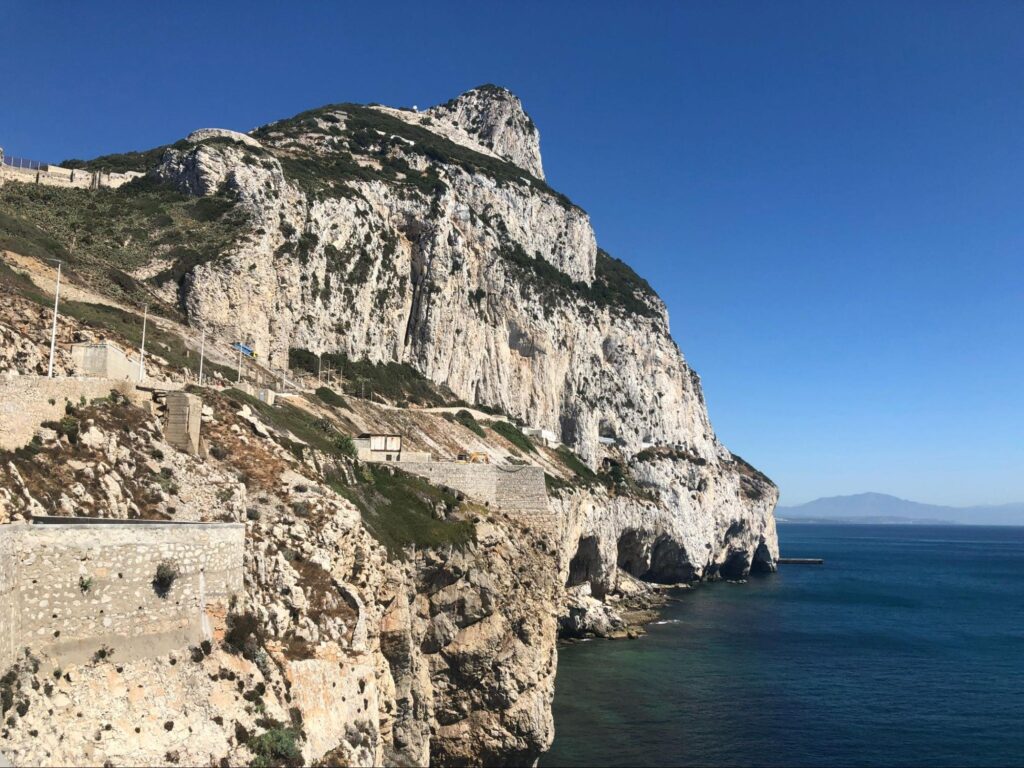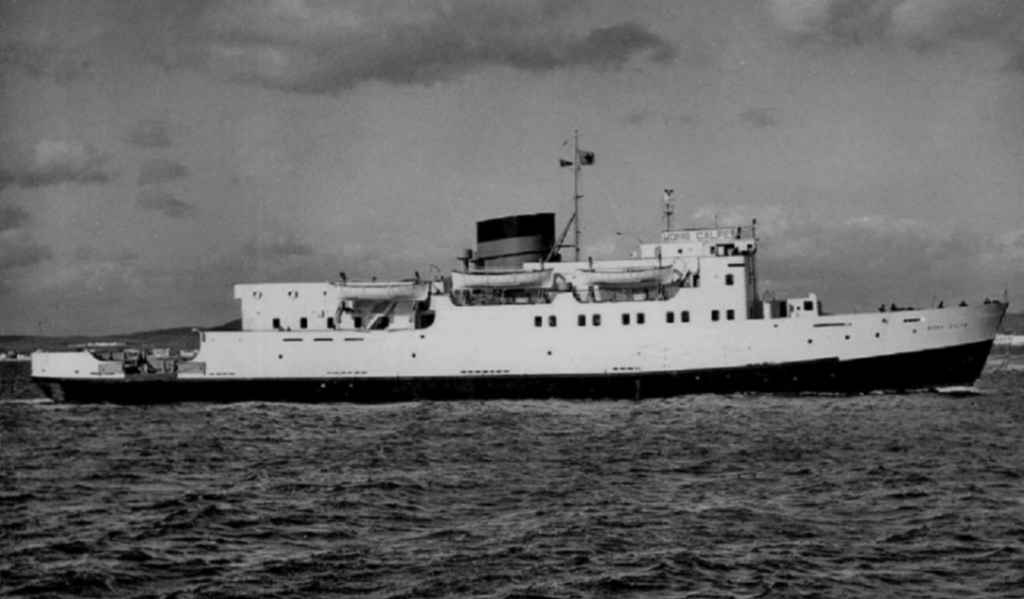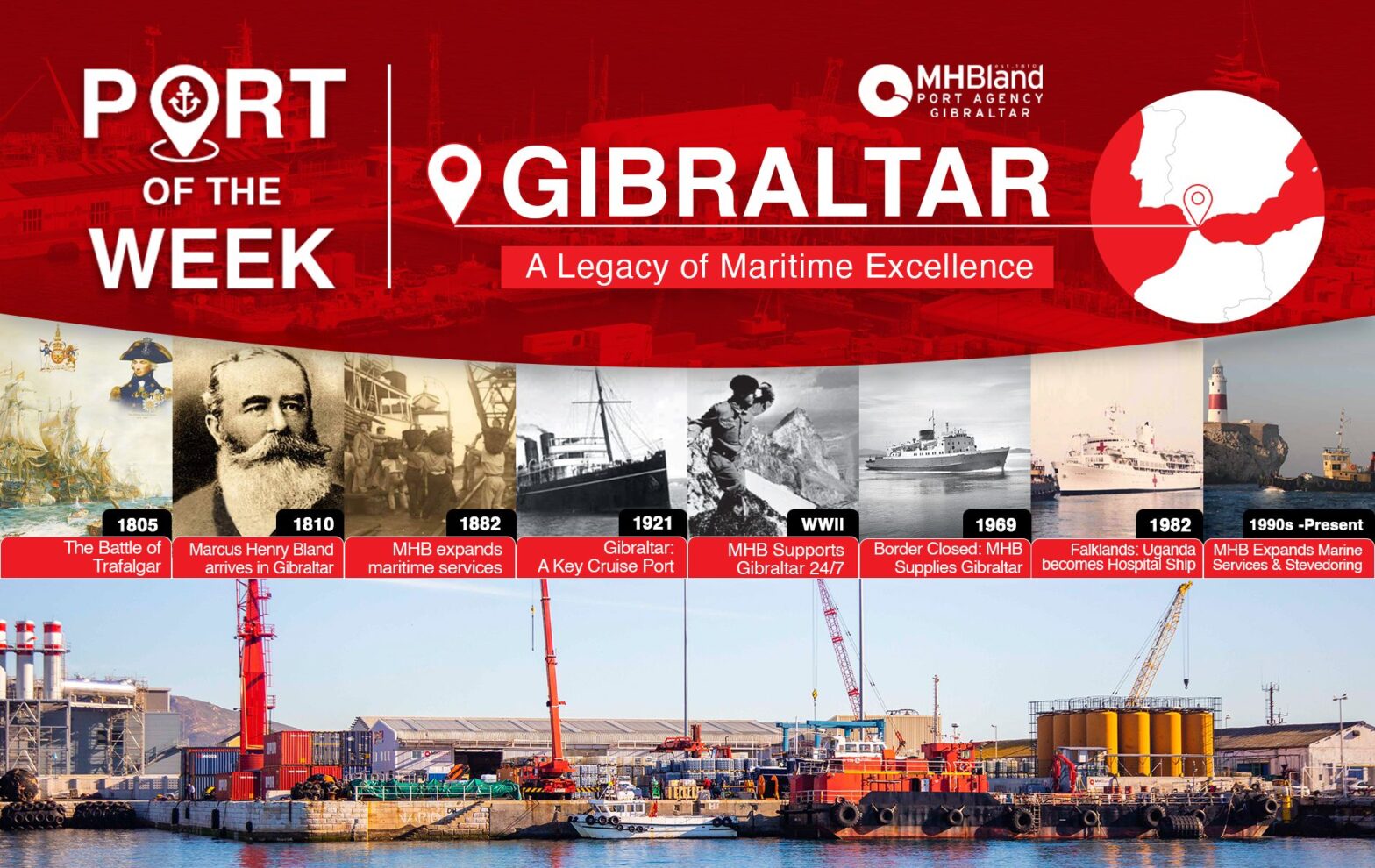For centuries, the port of Gibraltar has stood as a crucial maritime crossroads, a gateway linking the Atlantic and Mediterranean Seas. Sitting at the very edge of the continents of both Europe and Africa, this bustling harbour has witnessed the ebb and flow of empires, the evolution of global trade, and the transformation of maritime industries. MH Bland has been a significant part of Gibraltar’s marine story adapting and thriving alongside the port’s ever-changing landscape.
MH Bland was established in 1810 by Marcus Henry Bland, a Liverpool merchant who set up a shipping agency in Gibraltar. He capitalised on the port’s growing importance, serving the increasing number of commercial vessels and supporting the Royal Navy, 5 short years after the Battle of Trafalgar. This venture laid the foundation for the company that still exists today.
As the 19th century progressed, the importance of Gibraltar grew, particularly for the British Royal Navy. MH Bland, in its nascent stages, provided essential agency services, ensuring ships were provisioned and documented efficiently. This early involvement laid the groundwork for the company’s enduring presence in the port of Gibraltar.
Early Foundations

The history of the port of Gibraltar stretches far beyond the 19th century. In the late 16th century, Spain recognised its strategic importance, with Captain Diego de Medrano overseeing its development under the orders of Álvaro de Bazán. This early focus on fortification and port development shows Gibraltar’s long-standing role as a maritime stronghold.
Even before that, the infamous Rome-conquering Hannibal and the Carthaginians would have passed through the area, conquering the Roman capital from their bases in parts of Spain in the 3rd century BC. The Phoenicians (people from the Levant and Eastern Mediterranean) write of journeying to Gibraltar, which was a sacred site as long ago as the 10th century BC! Gorhams’ Cave is one of the most famous sites like this in Gibraltar, with evidence of Egyptian and Phoenecian artefacts placed in what we now know to have been a Neanderthal dwelling for up to 100,000 years.
However, the port’s history took a decisive turn in 1704, when Britain captured Gibraltar. This pivotal moment was formalised in 1713 with the Treaty of Utrecht, granting Britain full control over the Rock and its port. The acquisition proved highly lucrative, enabling British ships to navigate freely between London and the Mediterranean. Recognising the economic potential, Queen Anne declared the port of Gibraltar a free port in 1706. This action eliminated compensation taxes, attracting vessels from across the globe, from North Africa and Turkey to Italy and beyond, transforming Gibraltar into a major European trading centre.
The 19th Century: Expansion and Transformation

The 19th century marked a period of significant transformation for the port of Gibraltar. Its importance during the Napoleonic Wars and its role as a key supply point following the opening of the Suez Canal in 1869 further solidified its prominence. The British government embarked on an ambitious project to enhance the Royal Navy’s capabilities, aiming to ensure naval dominance. This initiative led to substantial harbour improvements, including the extension of the North and South Moles and the construction of the Detached Mole.
While these developments occurred, the construction of three large dry docks was underway, a massive undertaking that required over 2,000 workers. The sheer demand for stone and sand necessitated the creation of the Admiralty Tunnel, a feat of engineering that cut through the very heart of the Rock of Gibraltar. These infrastructural improvements transformed Gibraltar Harbour into a formidable naval and commercial hub.
Amidst this era of growth, a young Joseph Gaggero joined MH Bland as a junior clerk in 1866. His arrival marked a turning point for the company. Gaggero, with a keen eye for opportunity, witnessed the launch of the multipurpose paddle steamer Hercules 1, which began scheduled services to Morocco, highlighting the era’s spirit of innovation. He quickly recognised the importance of expansion and development. MH Bland, while maintaining its core ship agency business, began to diversify. They acquired a shipyard to build lighters, launches, and tugs, offering coastal towage and salvage services. They also became coal bunkering merchants, playing a key role in the development of the port of Tangier, and entered into beneficial contracts with London colliery firms. Following the end of the Bland family line, the Gaggero family purchased the business, ensuring its continued success and growth. They continue at the helm to this day,
A Hub of Commerce and Opportunity
The 19th century also witnessed the rise of a thriving commercial community within the port of Gibraltar. The port’s status as a global trade point created numerous opportunities for Gibraltarians. Many transitioned into skilled commercial traders, acting as intermediaries between ships and local consumers. They facilitated the distribution of goods, expanding the reach of international trade.
The demand for international goods was consistently high, with ships arriving from all corners of the world. This influx of trade allowed many to build their wealth, trading in high-demand commodities like tobacco and alcohol. The economic boom also fueled the growth of ancillary businesses, including ship repair stations and bars, creating jobs and further stimulating the local economy.
The 20th Century and Beyond: Adaptation and Innovation

As the 20th century dawned, the port of Gibraltar continued to evolve. The shift from coal to oil transformed the port into a crucial bunkering location. MH Bland, demonstrating its adaptability, diversified its services, offering ship handling, repairs, and logistics. This ability to adapt to changing technologies and market demands has been key to MH Bland’s longevity.
Today, in the era of digitalisation and sustainable shipping, MH Bland remains at the forefront of the maritime industry. The company continues to innovate, providing comprehensive port agency and marine services that meet the needs of modern shipping. From the age of sail to the complexities of contemporary logistics, MH Bland has been a steadfast partner in the ongoing story of the port of Gibraltar. Read more about the history of MH Bland here.
Through both civil and world wars, economic booms, and technological revolutions, MH Bland has consistently adapted, ensuring its continued success. As the port continues to evolve, MH Bland remains committed to providing exceptional services, building relationships, and upholding its legacy as a vital part of Gibraltar’s maritime heritage.
